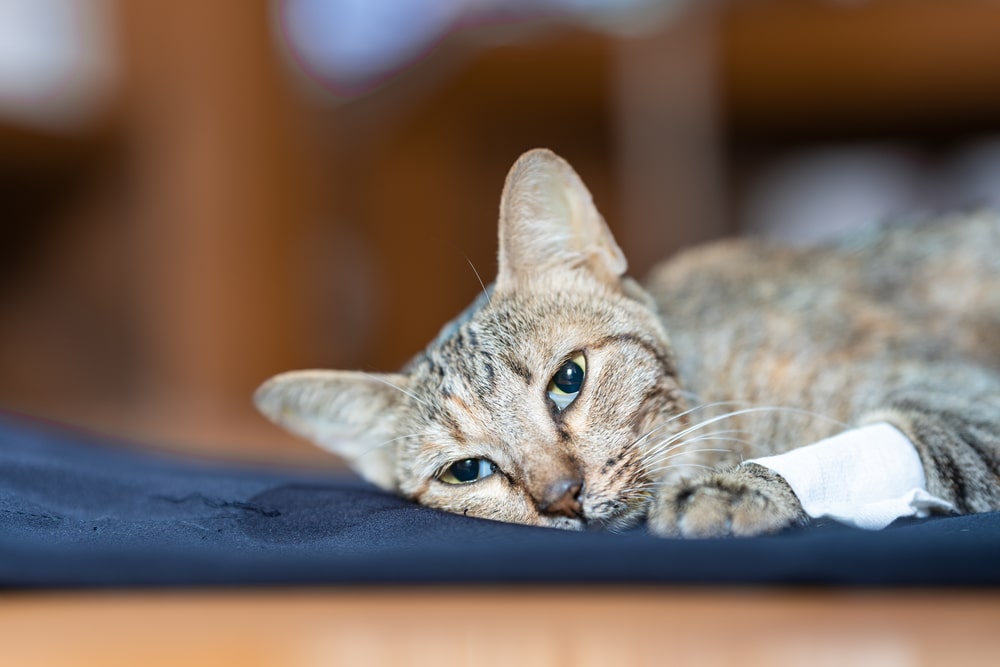Kidney disease is a serious condition which cats can develop for a variety of reasons, and it is more common in older cats (over 8 years).
It’s important to understand the causes and recognise the symptoms so you can get your furry friend the help they need as quickly as possible.
Symptoms
Acute kidney disease (disease that starts suddenly) and chronic kidney disease (CKD) which develops slowly over time have the same symptoms which include:
- Drinking more than usual
- Changes in peeing. Peeing more, or stopping altogether
- Weight loss and vomiting
- Low energy
- Bad breath smelling of urine
- Mouth ulcers
- Not grooming, greasy coat
- In severe cases, sudden blindness, hallucinating, pacing, fatigue, incontinence, body odour, inability to walk, seizures, confusion.
Causes
There are several causes of both acute and chronic kidney disease:
Acute Kidney Failure
- Infections: bacterial infections that affecting the kidneys or urinary tract infections, can lead to sudden kidney damage.
- Toxins: poisons such as antifreeze, some medications (like NSAIDs such as ibuprofen), rat poison or toxic plants (like lilies, including the water they are in) could cause acute kidney failure.
- Trauma or Shock: severe injuries to the kidneys or trauma can lead to kidney damage.
- Urethral Blockages: if a cat's urethra becomes blocked, they can’t pass urine which can cause kidney damage.
- Dehydration: severe dehydration can lead to reduced blood flow to the kidneys, which might cause kidney damage.
Chronic Kidney Disease (CKD)
- Natural Aging Process: As cats age, their kidneys may gradually lose their ability to function properly.
- Inherited Conditions: Some breeds have a higher risk of developing kidney disease such as Persians, British Shorthairs, Maine Coons, Burmese, Ragdolls and Siamese.
- Infections: Chronic kidney infections can lead to kidney damage and certain viruses such as Feline Immunodeficiency Virus (FIV), tick borne diseases and some parasitic infections e.g. kidney worms.
- Kidney Stones: Stones in the urinary system can cause blockages and damage to the kidneys.
- Cancer: Kidney tumours, though rare, are a cause.
- High Blood Pressure: Uncontrolled high blood pressure can damage blood vessels in the kidneys.
- Other Conditions: Diabetes, hyperthyroidism, and heart disease can also contribute to kidney disease.
- Diet: A diet high in protein and phosphorus can put extra strain on the kidneys. Ask your vet for food advice.
- Serious Dental Disease: Untreated dental disease could lead to systemic infections that can affect the kidneys.
Treatment
Whether or not your vet can treat your cat’s condition could depend on the cause of the problem and the severity of their condition. Your vet may treat your cat to get them stable, which might include giving intravenous fluids, appetite stimulants ands anti sickness medications. Once stable your vet may advise you give your cat a special diet with the right levels of protein, phosphorus and sodium, or your cat might need phosphorus binders to reduce levels in their system. Your cat will need regular check-ups to monitor their condition.
However, kidney disease is a serious condition that is difficult to detect until it is quite advanced and there may come a time when you have to consider their quality of life. Ask yourself how well they are coping; are they eating and drinking, cleaning themselves, coping with their condition? It might also be difficult for you to cope with the financial pressures and the stress of dealing with a sick pet. Talk to your vet as they will be able to support you through your decision-making process.
If you are at all worried about your cat, please talk to a vet as soon as possible to get a veterinary diagnosis, advice and treatment.

